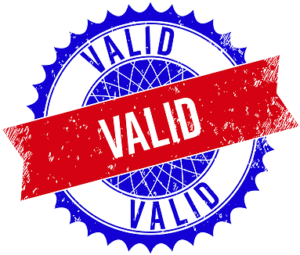 There are all sorts of reasons why a bet might be made void, such as an event not taking place as it was supposed to or a player that you’ve bet on as the First Goalscorer not actually playing. It can be frustrating when you’ve placed a bet that you’re sure is going to be a winner, only to find out that it has been made void and you’ve had your stake returned to you. It’s better than it ending up as a losing bet, of course.
There are all sorts of reasons why a bet might be made void, such as an event not taking place as it was supposed to or a player that you’ve bet on as the First Goalscorer not actually playing. It can be frustrating when you’ve placed a bet that you’re sure is going to be a winner, only to find out that it has been made void and you’ve had your stake returned to you. It’s better than it ending up as a losing bet, of course.
Knowing the reasons why a bet might be made void is helpful, given that it will stop you from puzzling over why your stake was put back into your account and the bet didn’t play out as you’d expect. There are some obvious reasons why it happens as well as some less obvious ones. There are also some bets you can place where might expect them to be made void but they’re not, which you need to know about too.
What A Bet Void Means
 Before we look into why a bookmaker might make a bet void, let’s briefly look into what making a bet void actually means. A voided bet is one that has basically been cancelled by your bookmaker. They have made your wager null and void, essentially returning it to a point that means it is as if it had never been placed. Your stake will be returned to your account, so you neither win nor lose the wager that you’ve placed.
Before we look into why a bookmaker might make a bet void, let’s briefly look into what making a bet void actually means. A voided bet is one that has basically been cancelled by your bookmaker. They have made your wager null and void, essentially returning it to a point that means it is as if it had never been placed. Your stake will be returned to your account, so you neither win nor lose the wager that you’ve placed.
In many instances, this is the fairest way that a bookmaker can find to handle a certain event. It might feel a bit rubbish to the bettor, but from the bookie’s point of view it wouldn’t be fair to pay it out as if it’s a winner and also wouldn’t be right to just take your stake, so giving it back to you without penalty is the right thing to do. It doesn’t happen often, but can take place for a whole host of reasons.
Why Bets Are Voided
In essence, there are two main reasons why a bet might be made void: ones where you’ve done nothing wrong and ones where the bookmaker suspects you might have done something wrong.
Let’s start by taking a look at the former category, which is obviously much more pleasant to think about than the latter. Here’s a look at some of the ‘good’ reasons a bet might be made void:
Non-Runner
 It’s common to think of non-runners in horse racing, largely because that’s a sport that lends itself to horses not taking part in an event for one reason or another. The same reasoning can be used to explain the likes of a football bet being made void, however. In essence, it means that the person or animal that you’ve bet on doesn’t take part in the event that they were supposed to be part of.
It’s common to think of non-runners in horse racing, largely because that’s a sport that lends itself to horses not taking part in an event for one reason or another. The same reasoning can be used to explain the likes of a football bet being made void, however. In essence, it means that the person or animal that you’ve bet on doesn’t take part in the event that they were supposed to be part of.
A bet placed on the First Goalscorer market, for example, will be made void if the player that you’ve bet on starts on the substitutes bench and doesn’t come onto the pitch until after the match’s first goal has been scored. A bet on a greyhound to win a race in which the dog doesn’t take any part will also be made void. A wager on a golfer to win a tournament that he doesn’t start for some reason, such as injury, will also become voided, etc.
Postponed Or Abandoned
 You can bet on football teams to win a match, horses to win a race or tennis players to win a tournament, but if the event is either postponed or cancelled altogether then there’s a chance that your bet will be made void. Bad weather is one of the chief causes of a sporting even being postponed, with most bookmakers having a rule that if it isn’t rearranged to take place within a certain time period then all bets on it will be voided.
You can bet on football teams to win a match, horses to win a race or tennis players to win a tournament, but if the event is either postponed or cancelled altogether then there’s a chance that your bet will be made void. Bad weather is one of the chief causes of a sporting even being postponed, with most bookmakers having a rule that if it isn’t rearranged to take place within a certain time period then all bets on it will be voided.
The same is true of an event that gets underway but doesn’t reach its conclusion. There are all sorts of reasons why a match might start but not finish, such as crowd trouble or floodlights not working. What can make things slightly more complex is if you’ve placed a bet on something like the First Goalscorer and this market has been settled before the match in question is abandoned, meaning that bet will be settled but others won’t be.
Rules Change
 There are loads of reasons why a bookie might decided to void a bet that seem a bit unfair to punters. An example of this is a rule change that the bookmaker in question feels significantly alters the terms of the original bet. A cricket match might end up being played over fewer overs than originally planned, for example, or a tennis match might be moved from a clay court to a grass one for some reason.
There are loads of reasons why a bookie might decided to void a bet that seem a bit unfair to punters. An example of this is a rule change that the bookmaker in question feels significantly alters the terms of the original bet. A cricket match might end up being played over fewer overs than originally planned, for example, or a tennis match might be moved from a clay court to a grass one for some reason.
All bookmakers offer explanations for what changes can take place to an event that will lead them to make a bet void, so make sure you read their terms and conditions if this is something that concerns you. It’s normally an entirely fair and rational reason, even if you don’t think that is the case. Believe it or not, bookies try to be fair when possible when considering whether to make a bet void for whatever reason.
Errors Have Been Made
 It’s not uncommon for bookmakers to make mistakes. There are plenty of words in their small print about what happens in the event that an error has been made, but the main takeaway is that they’ll void your bet and return your stake money to you. This can be something such as a market not switching to In-Play betting after it has already got underway, for example, or obviously wrong odds being offered on a certain outcome.
It’s not uncommon for bookmakers to make mistakes. There are plenty of words in their small print about what happens in the event that an error has been made, but the main takeaway is that they’ll void your bet and return your stake money to you. This can be something such as a market not switching to In-Play betting after it has already got underway, for example, or obviously wrong odds being offered on a certain outcome.
This is known as a palpable error, which is when a bookmaker has offered odds on something that can clearly be interpreted as a mistake. If you are looking at the market on a football match and the home team is 3/2 to win with every single bookmaker apart from one that has them at 32/1, that is a palpable error and you’ll have your bet made void if you manage to place one before the bookie in question notices their mistake.
Suspicious Betting Patterns
 The best example of a nefarious reason that a bookmaker might make a bet void comes in the form of suspicious betting patterns. Bookies run all sorts of algorithms that look at every single bet that is placed on their markets. If a punter has placed a number of bets that appear to be suspicious for whatever reason, then they will be flagged up. Oftentimes the bookmaker can’t prove that there’s anything dodgy going on so they’ll just void the bet.
The best example of a nefarious reason that a bookmaker might make a bet void comes in the form of suspicious betting patterns. Bookies run all sorts of algorithms that look at every single bet that is placed on their markets. If a punter has placed a number of bets that appear to be suspicious for whatever reason, then they will be flagged up. Oftentimes the bookmaker can’t prove that there’s anything dodgy going on so they’ll just void the bet.
The bets that you’ve placed might flag up as suspicious for entirely innocent reasons, so you don’t need to worry if you’ve done nothing wrong but had your bet or bets made void for this reason. The truth is that bookmakers have all sorts of things in their small print that allow them to make bets void for whatever reason they want. They don’t tend to use such power spuriously, but if they want to make a bet void they’ll find a reason to.
Bets That Won’t Be Made Void
 There are a number of bets that, no matter how much you might like them to be, won’t be made void by bookmakers. One of the obvious examples is a Last Goalscorer bet that you’ve placed on a player who started on the substitutes bench but makes it on for the final few seconds of a match. Though they didn’t get a fair crack at the goalscoring whip, they technically still could have scored the final goal and so the bet stands.
There are a number of bets that, no matter how much you might like them to be, won’t be made void by bookmakers. One of the obvious examples is a Last Goalscorer bet that you’ve placed on a player who started on the substitutes bench but makes it on for the final few seconds of a match. Though they didn’t get a fair crack at the goalscoring whip, they technically still could have scored the final goal and so the bet stands.
The same thing is true of bets that have already been settled in an event that ends up being abandoned or postponed. The example of a First Goalscorer bet having been settled in a football match is the obvious one mentioned elsewhere, but something such as the winner of the first point in a tennis match that later gets abandoned or a horse that wins the first race in a meeting that is then called off also count. None of these bets will be made void if they’ve already been settled.
Another example that is really important to draw attention to is ante-post bets placed well in advance of a race. It’s not uncommon for bettors to look at events such as the Cheltenham Gold Cup, the Grand National or the Coronation Cup months in advance of them actually taking place. The benefit of this is that they will be offered better odds than if they tried to place the bet a couple of hours before the race, but there are downsides.
One such downside is that bookmakers will not void the bet if the horse doesn’t end up taking part in the race. Owners and trainers will often enter horses into several races during a meeting and only decide late on which one they’ll actually run in. If the race you’ve bet ends up not being the one that they choose for the horse then your stake money is lost and your ante-post bet will go down as a loser.
This is why it’s really important to keep an eye out as the bigger events approach and bookmakers begin making offers. It’s not uncommon for a bookie to decide that bets on the Grand National placed, say, a week in advance can be made void if the horse doesn’t run. You won’t get offers like that months in advance of the event, but it’s not unheard of for them to be available a couple of days before the race gets underway.
Horse racing is an easy example to use, but the same sort of rules apply to ante-post bets placed on the Top Goalscorer at the World Cup when the player you’ve bet on doesn’t take part because of an injury, for example. Equally, an ante-post bet on a golfer to win the Masters or a tennis player to win Wimbledon will not be made void if they end up not taking part in the event in question for whatever reason.
Void Bets In Accumulators

Accumulator bets are popular because they give punters the opportunity to win a decent amount for a relatively small initial stake. Things can become slightly complicated when one of the legs of your accumulator ends up being made void, however. In essence, there’s nothing that you need to worry about on this front because online bookmakers do it all for you automatically, but it’s still good to know how it works.
In their simplest form, accumulators that feature a voided market just become slightly smaller Accas. In other words, a ten-fold accumulator with a voided leg becomes a nine-fold, a four-fold becomes a Treble, a Double becomes a straight Single and so on. The same is true if you opt for a Lucky bet, with a Lucky 31 turning into a Lucky 15 and the portion of your stake that was placed on the new voided Singles, Doubles etc within the Lucky wager just returned to your account.
Things are more complicated if you’ve taken an offer like Acca Insurance on your bet, which sees your stake refunded in the event that just one leg of the accumulator is a loser. These normally require you to make a minimum number of selections, say four, so if one leg of your Acca is made void then it becomes a Treble and is no longer valid for the insurance offer. Sadly, that is just something that you have to suck up and take. All you can do is have a look why that leg was made void and bear it in mind in the future.
Complaining If You Think It’s Unfair
 If you think your bet has been made void unfairly then the first thing that you should do is contact the bookmaker in question. Yes, this seems like a waste of time when you consider the fact that it was the bookie that voided it in the first place, but if you later want to take it further with one of the bodies responsible for investigating complaints against bookmakers then the first thing they’ll want to know is if you tried to resolve it with the company in question.
If you think your bet has been made void unfairly then the first thing that you should do is contact the bookmaker in question. Yes, this seems like a waste of time when you consider the fact that it was the bookie that voided it in the first place, but if you later want to take it further with one of the bodies responsible for investigating complaints against bookmakers then the first thing they’ll want to know is if you tried to resolve it with the company in question.
If the bookmaker does what you’d expect them to do and essentially fob you off by saying that it’s in their terms and conditions that they can void any bet they’d like, or some such thing, the next thing to do is to look to a body like IBAS. The Independent Betting Adjudication Service will look at your case and decide if it’s got any merit, aiming to resolve the dispute in question if they think that it is.
In the event that the bet that was made void was placed using a free bet, you’re unlikely to get said free bet back. That’s not really something that the likes of IBAS will deal with, but you can get in touch with your bookie of choice and explain the situation. Sometimes they’ll give you another free bet if you’re polite and they want to keep your custom. If not, that’s unfair but it’s well within the rules and not something you can really complain about.
